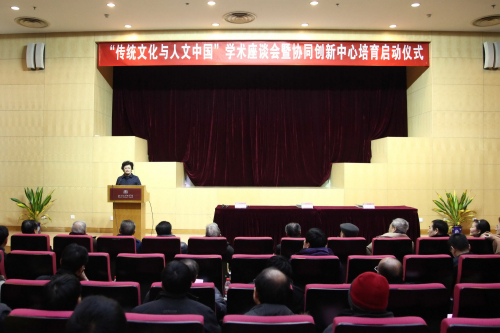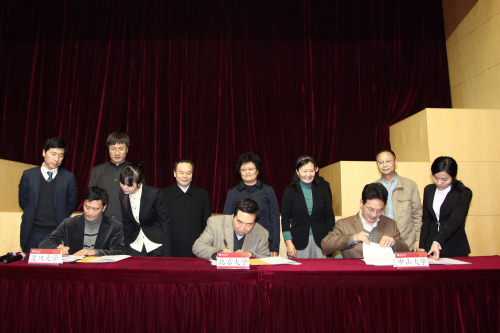Peking University, Fudan University and Sun Yat-sen University Jointly Held the Launching Ceremony of the Cultivation of the Coordinative Innovation Center for Traditional Culture and Humanistic China
Source: Office of Social Sciences and Humanities
Photograph Source: Peking University News
Written by: Office of Social Sciences and Humanities
Translated by: Zheng Sida
Peking University, Fudan University and Sun Yat-sen University jointly held the launching ceremony of the cultivation of the "Coordinative Innovation Center for Traditional Culture and Humanistic China" in Peking University on January 25th, 2013. Li Weihong, Deputy Minister of the Ministry of Education, attended the ceremony. Leaders of the three universities of the coordinative innovation center including Zhou Qifeng, President of Peking University; Liu Wei, Vice President of Peking University; Li Ping, Deputy Secretary of SYSU Party Committee; and Yang Zhigang, Director of Office of Liberal Arts Research at Fudan University, attended the ceremony and delivered a speech respectively. Ni Xing, Director of Office of Social Sciences and Humanities at SYSU, and Professor Chen Shaoming from the Department of Philosophy at SYSU, attended the conference. The preparation staff of the formation and cultivation period of the “Coordinative Innovation Center for Traditional Culture and Humanistic China”, the scholar representatives of relevant disciplines, persons in charge of functional departments, and postgraduate representatives from the three universities, a total of nearly 100 people attended the conference.

The launching ceremony of the cultivation of the “Coordinative Innovation Center for Traditional Culture and Humanistic China”
Deputy Secretary Li Ping pointed out in her speech that, China’s national comprehensive strength has significantly improved after more than 30 years of reform and opening-up, and an era of great construction, great development and great prosperity of culture is coming. The “Coordinative Innovation Center for Traditional Culture and Humanistic China” plans to cover the wide-ranging humanities discipline group, combine classics, value and order, and unfold the vision of past, present and future; with the organizational idea of integrating talents, disciplines and research, it will break traditional discipline barriers formed under the influence of contemporary Western learning, promote new growth of knowledge and brew reform in cultural learning, which is of great significance for strengthening the Chinese people’s cultural identity and cultural confidence, and for constructing the Chinese people’s common spiritual home. SYSU will make all efforts to implement its coordinative task, cooperate actively, innovate keenly and develop jointly with the coordinative units, and make contributions to the cultural construction of the nation.
Deputy Minister Li Weihong delivered a concluding speech. She emphasized that the cultivation and formation of the coordinative innovation center should be fully integrated with the spirit of “Opinions on Further Promoting the Prosperity and Development of Philosophy and Social Science at Universities of the Ministry of Education”, improve and implement the daily operating mechanism, and constantly enrich the forms and contents of coordinative innovation. She had high hopes for the formation of the “Coordinative Innovation Center for Traditional Culture and Humanistic China”, and expected that the cultivation work would achieve substantive effects. She asked the three universities to focus closely on the fundamental starting point of meeting our country’s urgent need and world-class standard; through the construction of the coordinative innovation center and in accordance with the three-dimensional framework of classics, value and order, integrate domestic and foreign research resources on traditional culture, cover the research of national culture and oversea sinology on the basis of the disciplines such as liberal arts, history, philosophy and archaeology; seek for connections, similarities, complementarities and symbiosis, and form an interdisciplinary academic entity on the basis of existing academic orientations and research work of institutions and individuals; cultivate and develop research on traditional culture against the background of contemporary China and the world by making use of the coordinative innovation mechanism. Meanwhile, the three universities should further innovate the operating mechanism to improve the sustainable development ability, expand international exchange and cooperation to raise China’s international academic impact and discourse power, promote Chinese culture to go global and increase the international influence of Chinese thought and culture, further improve the quality of talent cultivation and vigorously promote the innovation of talent cultivation mode.

The three universities signed the agreements.
At the ceremony, the three universities signed four formation agreements including Agreement on Organizational Setup and Management Operating Mechanism; Agreement on Post Setting, Personnel Employment and Personnel Management; Agreement on Coordinative Cultivation of Talents; and Agreement on Integration of Resources and Sharing of Results.
The launching of the cultivation of the “Coordinative Innovation Center for Traditional Culture and Humanistic China” is an effort by the three universities to implement the spirit of Comrade Hu Jintao’s speech at Tsinghua University’s centennial anniversary in 2011, to implement “Opinions on Carrying out the Plan of Improving Universities’ Innovation Ability” (Department of Science and Technology of the Ministry of Education [2012] No.6) of the Ministry of Education and the Ministry of Finance, and it is in accordance with the requirements of “improving innovation ability by integrating talents, disciplines and research”. It is a significant milestone in carrying out coordinative innovation in the field of philosophy and social sciences.
"The Coordinative Innovation Center for Traditional Culture and Humanistic China" will take the classics as the core and grasp the connotation of humanistic China from a multi-disciplinary perspective. The center will build seven innovation platforms including classical hermeneutics; Chinese traditional political culture; classics and Chinese traditional learning; ethics, education and value system; material basis of humanistic China; Chinese culture against the Asian background; and reconstruction of humanistic China. With regard to the innovation of mechanism and system, the center will set up departments including advisory committee, joint director and management committee, academic and employment committee, and teaching committee, and implement the open personnel system of contractual employment and job mobility. In the matter of evaluation mechanism, it will follow the standard of academic originality, give priority to quality, oppose the blind pursuit of quantity, raise the weighting of peer reputation, and improve the academic systems of oral defense, recusal, publicity, feedback, appeal and reporting. Through coordination in organizational management, talent teams, student cultivation, scientific research, resources and results, it will strive to fully unleash the energy of innovation elements.
